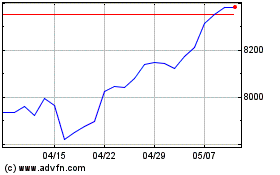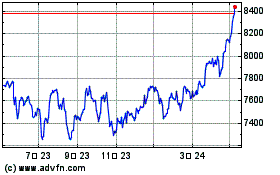Stocks Stabilize, Treasury Yields Tick Higher
2020年2月27日 - 12:37AM
Dow Jones News
By Anna Isaac and Chong Koh Ping
U.S. stocks rallied in early trading Wednesday as investors
struggled to assess the impact of the fast-spreading coronavirus
and its economic fallout.
The Dow Jones Industrial Average gained 278 points, or 1%,
shortly after the opening bell in New York. The S&P 500 rose
1.1%, while the Nasdaq Composite jumped 1.4%,
Investors have been hoping for markets to stabilize after the
Dow fell more than 1,900 points Monday and Tuesday in its largest
two-day point decline on record. U.S. health officials said this
week that they expect a wider spread of the coronavirus and are
preparing for a potential pandemic.
"This is a time of peak uncertainty for coronavirus," said
Edward Park, deputy chief investment officer at Brooks Macdonald.
"We don't yet know the size of how much it's spread or the
mortality rate. That's what markets are reacting to, peak
uncertainty, rather than facts."
Treasury yields also ticked higher. The yield on the benchmark
10-year note rose to 1.365% in volatile trading. On Tuesday, it
settled at an all-time low of 1.328% as fund managers sought the
safety of government bonds, extending a decadeslong rally.
Yields had been under pressure in recent days in part because of
a growing expectation among investors that the Federal Reserve may
cut interest rates at least two times later this year. But Federal
Reserve Bank of Dallas President Robert Kaplan told The Wall Street
Journal Tuesday that events were still too fluid around the
coronavirus outbreak for the central bank to cut short-term
interest rates.
"There's a big question over how efficient it might be to have
more easing from the Fed," Mr. Park said. "More fiscal stimulus
might be needed to stimulate growth in the short term."
Meanwhile, the recent surge in volatility in U.S. equity markets
showed few signs of abating. The Cboe Volatility Index, a closely
watched measure of market turbulence known as VIX, remained
elevated on Wednesday at 25.9.
"Markets are reacting to snippets of news or even a few hours of
silence, " said Paul O'Connor, head of the U.K.-based multiasset
team at Janus Henderson Investors. "The spike up in volatility this
week reflects the increased uncertainty over the economic outlook.
Investors are deleveraging."
Regional equity indexes across most of Europe pared losses. The
pan-continental Stoxx Europe 600 slipped less than 0.1%. The U.K.'s
equity benchmark FTSE 100 index was recently down 0.2%.
"Investors do not want to catch this falling knife," said James
Athey, a senior investment manager at Aberdeen Standard
Investments. "The speed with which equities are declining here is
something investors find very troubling. It's hard to see people
willing to step in and buy."
Futures on Brent crude, the benchmark for global oil prices,
fell 0.4% to $54.02 a barrel.
In Asia, markets closed lower. Japan's Nikkei 225 index shed
0.8% to reach its lowest level since October. Australia's
S&P/ASX 200 dropped 2.3% and Korea's Kospi retreated 1.3%.
"The market is pricing in a significant slowdown in global
growth and corporate earnings," said Ong Zi Yang, senior macro
analyst at FSMOne.com in Singapore. "It is hard to quantify the
economic impact now but there will definitely be a slowdown."
Deaths and confirmed cases of the coronavirus have continued to
climb outside China -- notably in Italy, Iran, Japan and South
Korea. Concerns among investors that the virus will spread further,
disrupting the global economy, have triggered two sharp consecutive
stock selloffs this week.
Many European and Asian benchmarks, including those in Germany,
Japan, and South Korea are now solidly in negative territory for
the year. Germany's DAX is down around 3% year-to-date, while Hong
Kong's Hang Seng Index and the Kospi in Seoul have both declined
more than 5%.
"This is a classic case of risk aversion," said Kelvin Tay,
regional chief investment officer at UBS Global Wealth Management
in Singapore, who added that markets were likely to remain
volatile.
In currencies, the British pound fell 0.6% against the dollar
amid concerns about the government's mandate for trade talks with
the European Union, which is due to be made public Thursday.
Salesforce.com fell 1.8% after the company said its Co-Chief
Executive Keith Block would step down just 18 months after taking
the job.
Alexander Osipovich contributed to this article.
Write to Anna Isaac at anna.isaac@wsj.com and Chong Koh Ping at
chong.kohping@wsj.com
(END) Dow Jones Newswires
February 26, 2020 10:22 ET (15:22 GMT)
Copyright (c) 2020 Dow Jones & Company, Inc.
FTSE 100
指数チャート
から 3 2024 まで 4 2024

FTSE 100
指数チャート
から 4 2023 まで 4 2024
